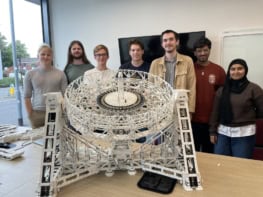Patricia Fara reviews Magnificent Principia: Exploring Isaac Newton’s Masterpiece by Colin Pask

Colin Pask is a very bossy author. “These chapters…should not be missed!” he instructs his readers. “You must read the final chapter,” he orders. Reflecting this self-confident panache, the preface of his Magnificent Principia: Exploring Isaac Newton’s Masterpiece is called “Why you should read this book”. However, the only reason he gives is that Isaac Newton was important for modern science, which is true but unhelpful. I would like to ask Pask a different question: “Who did you write this book for?” Or, to put it more bluntly, “Who is likely to buy it?”
Books about Newton have three main target audiences: the general reader (whoever that might be), historians and scientists. All publishers and many writers have a mass market in sight, and – as James Gleick demonstrated in 2003 with his book Isaac Newton – it is certainly possible for a well-informed and detailed account of a scientific icon to be a bestseller. But as Stephen Hawking might or might not have remarked, every equation halves sales, and Pask’s version of “Newton made lite” assumes (in an introductory section called “Fundamentals”) that all his readers will be familiar with calculus. Although his equations and diagrams are not too off-putting for anybody with university-level mathematics, many potential purchasers will blench on flicking through what resembles an advanced physics primer.
In that sense, the immediate impact of Pask’s book is not so very different from that of the original Principia. Pask reprimands Newton for using geometry and writing like Euclid, although this had nothing to do with Newton’s decision to make the Principia difficult: the famously reclusive Lucasian professor wanted to keep out of the limelight and “avoid being baited by little Smatterers in mathematics”. For Newton and many of his contemporaries, civilization had gone downhill since the time of the Greeks, and he was determined to recover the lost but pure knowledge of the ancients. Under his influence, British mathematicians spurned algebra until the early 19th century, mocking it as a fancy French practice of juggling with symbols devoid of real-world significance. It was only after a group of Cambridge undergraduates demanded to learn about the latest Laplace transforms and Legendre polynomials being used in Paris that the continental calculus originated by Gottfried Leibniz (or “Leibnitz”, as Pask would have it) was imported across the Channel.
So what about historians? Would they buy Pask’s book? The equations are not necessarily a deterrent, as a substantial proportion of science’s historians (myself included) have first degrees in science. But would they want to brush up their rusty integration techniques? Personally, I abandoned physics not because it was too difficult, but because I found it boring. Other lapsed scientists who share my passion for the past would already be familiar with the content of the introductory historical sections of Magnificent Principia and would have little incentive to work their way through 400 pages of technical explanation.
Historians would also be wary of Pask’s decision to present the Principia as a finished product. Like other historical inaccuracies, this reflects his preference for adulating Newton as a superhuman genius rather than appraising him as an extremely talented but fallible mortal. The Principia may well deserve Pask’s accolade of magnificence, but it was neither a single-authored book nor one that appeared at a single moment in time. Pask’s analysis is based on the Principia‘s third edition, which was published four decades after the celebrated year of 1687. That might not matter too much if Newton himself had been responsible for all the revisions, but it was Roger Cotes, a young astronomy professor at Cambridge, who forced Newton to confront his mistakes and corrected many of them for him. Newton’s attitude was surprisingly lackadaisical. “Such errors as do not depend upon wrong reasoning can be of no great consequence and may be corrected by the Reader,” he pontificated from his superior position as president of the Royal Society. Undeterred, the more perfectionist Cotes – dismissed in one short paragraph by Pask as irrelevant – bombarded Newton with letters for years, repeatedly challenging his experimental results as well as his theoretical calculations, and refusing to accept any attempts to fudge the evidence.
In contrast, I imagine many practising scientists will welcome this book, which is effectively a guided translation of the Principia‘s geometrical arguments into modern mathematical language. Yet even here, Pask’s devotion to his hero sometimes tempts him to be misleading. An emeritus professor of mathematics at the University of New South Wales, Australia, he knows the differences between Galilean invariance and special relativity, yet he is so keen to claim Newton as the originator of everything that he implicitly elides them. Albert Einstein abhorred the meaningless cocktail-party phrase “Everything is relative” bandied about by artists and writers, but unwary readers could easily deduce from this book that special relativity is merely a modification of the classical theory.
People who are convinced that Newton was the first great scientist have to face the tricky truth that Newton was deeply religious, which didn’t just mean going to church on Sundays. Pask omits to point out that Newton could never have subscribed to modern relativity theory because for him, there had to be an absolute time and space: they were God Himself, and He was immanent throughout the universe. Today’s Newtonianism is deterministic, but that feature was introduced by Pierre Laplace, the self-styled French Newton, at the end of the 18th century. To the disdain of Leibniz and other critics, Newton posited a God who intervened from time to time by sending in comets with animated tails. Newton derived the concept of an active nature, a “perpetual worker”, from his alchemical studies – a crucial topic ignored in this?study.
Newton remains one of science’s most revered figureheads. Yet paradoxically, he would have been appalled by modern Newtonian models of the cosmos, because they leave no place for spirit. He wasn’t even a scientist (a word not invented until 1833), but a natural philosopher who regarded the Bible, alchemy and experimentation as three related routes towards God. And he broke all the rules in the scientific code of behaviour by sometimes twisting the facts to fit his preconceptions – a tendency that is, regrettably, occasionally shared by Pask.
- 2013 Prometheus Books $26.00hb 528pp



